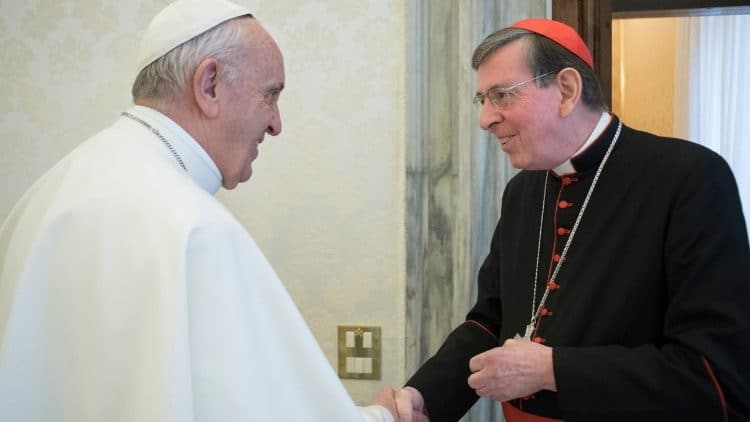Pope Francis’ trip to Cyprus and Greece will make “an important contribution to overcoming obstacles inherited from history, on the way that leads to Christian unity,” says in this exclusive interview with Exaudi, Swiss Cardinal Kurt Koch, 71, President of the Pontifical Council for Promoting Christian Unity. The cardinal will also leave on December 2 for Nicosia, and then Athens, on the papal flight where Exaudi’s editorial director, Deborah Castellano Lubov, will travel among the Vatican press corps.
The Leader of Cyprus’ Catholics: ‘Pope Comes to Teach & Learn’
Pope Francis trips’ with ecumenism at their heart have become more and more numerous. The list includes the Pope’s visit to Sweden in 2016, to commemorate the 500 years of the Protestant Reformation, and his trip in 2018 to Geneva, Switzerland, for the 70th anniversary of the founding of the World Council of Churches, Moreover, Francis has visited several countries with an Orthodox majority: Georgia, Bulgaria, North Macedonia, Romania and now Cyprus and Greece (where he already went in 2016, but only to Lesbos). However, not to be forgotten is his meeting with Patriarch Kirill of Moscow in 2016, and before that, his visit to Istanbul, Turkey, in 2014, where Francis visited Ecumenical Patriarch Bartholomew.
For Cardinal Koch, who since 2010 has headed the Vatican Dicastery promoting ecumenism, Pope Francis’ presence in Cyprus and Greece “will contribute to deepening the so-called ecumenism of charity, or the cultivation of friendly relations between Christians and between Churches. But the dialogue of charity prepares and supports theological dialogue.” And, given that “among the Christian Churches, the Orthodox are undoubtedly the closest to our Catholic Church, it’s important to rediscover unity, so that the Church in the East and in the West can live together again in peace and harmony,” explains the Vatican prelate.
Below is Exaudi’s interview with Cardinal Koch.* * *
EXAUDI: Pope Francis is leaving for Cyprus and Greece, two countries of ancient Orthodox Tradition. How would you describe the ecumenical value of this trip?
CARDINAL KURT KOCH: Cyprus and Greece are two countries where Christianity was already introduced in ancient times, thanks to the missionary work of Saint Paul, and in which the majority of the population today professes the faith of the Greek-Orthodox Church. Of all the Christian Churches, the Orthodox are without a doubt the closest to our Catholic Church. Hence, it’s important to find unity again, so that the Church in the East and in the West can live in peace and harmony again together. In this sense, Pope Francis’ trip to Cyprus and Greece is certainly an important step and a significant ecumenical event. Pointed in this direction also are the key words of the trip: “Comforting Each Other in Faith,” and “Let Us Open Ourselves Ever More to God’s Surprises.” I earnestly hope that these words will be realized during Pope Francis’ trip and that the communion between Orthodox and Catholics can be reinforced.
EXAUDI: To advance the path of ecumenism, Pope Francis stresses personal encounters and getting to know each other better; however, it’s also important to remove theological and doctrinal obstacles, on points that divide Catholics and Orthodox. What contribution can these trips and Pope Francis’ meetings with leaders of different Orthodox Churches, make to ecumenical theological dialogue?
CARDINAL KURT KOCH: The Orthodox Churches have decided that the theological dialogue between them and the Catholic Church must not be carried out through bilateral meetings and talks, but at the multilateral level and, more precisely, through the Mixed International Commission for the Theological Dialogue, in which fourteen different autocephalous or autonomous Orthodox Churches are involved. Hence there is no separate theological dialogue with the Orthodox Churches of Cyprus and Greece. Moreover, during the Pope’s trip, theological dialogues will not be able to take place; there wouldn’t be enough time. Rather, the Holy Father’s trip will contribute to reflect further on the so-called ecumenism of charity, or the cultivation of friendly relations between Christians and between Churches. However, the dialogue of charity prepares the theological dialogue of truth and supports it. In this connection, there can also be recognized in the Pope’s trip an important contribution to the overcoming of obstacles inherited from history, on the way that leads to unity.
EXAUDI: You are accompanying Pope Francis to Cyprus and Greece. What do you foresee as being the most memorable moments of the trip?
CARDINAL KURT KOCH: The trip’s most significant event will certainly be Pope Francis’ meetings with His Beatitude Chrysostom II, the Orthodox Archbishop of Cyprus, and with His Beatitude Hieronymus II, the Orthodox Archbishop of Athens and All Greece, and with the respective Holy Synods. Of course the Holy Father will also pay visits to the Catholic Church in both countries and will celebrate Mass with the faithful and priests. Also planned are meetings with the Presidents and Governments of the countries and with representatives of the civil society and of the Diplomatic Corps. It will be important for Francis on this trip also, to call attention to the fate of migrants and refugees. An ecumenical celebration is planned with migrants in Cyprus. Moreover, the Pope will go again to the Island of Lesbos, to meet with refugees of the Mitilene hospitality center. The situation of refugees is, in fact, a challenge that concerns and affects alike all Christians and all Churches.
EXAUDI: Thank you very much, Your Eminence.
Ambassador: ‘Cyprus Needs Pope Francis’ Words of Peace & Hope’










